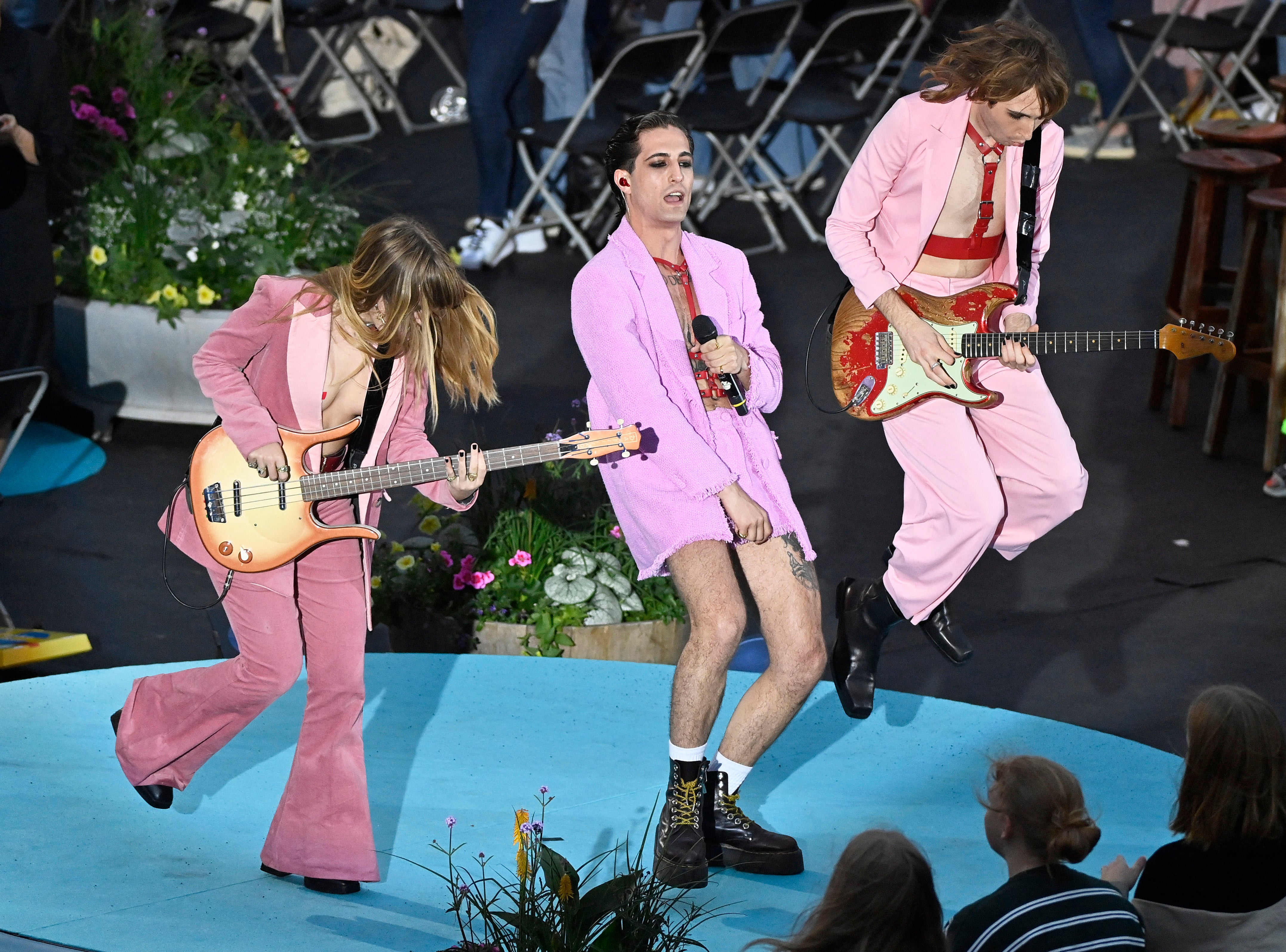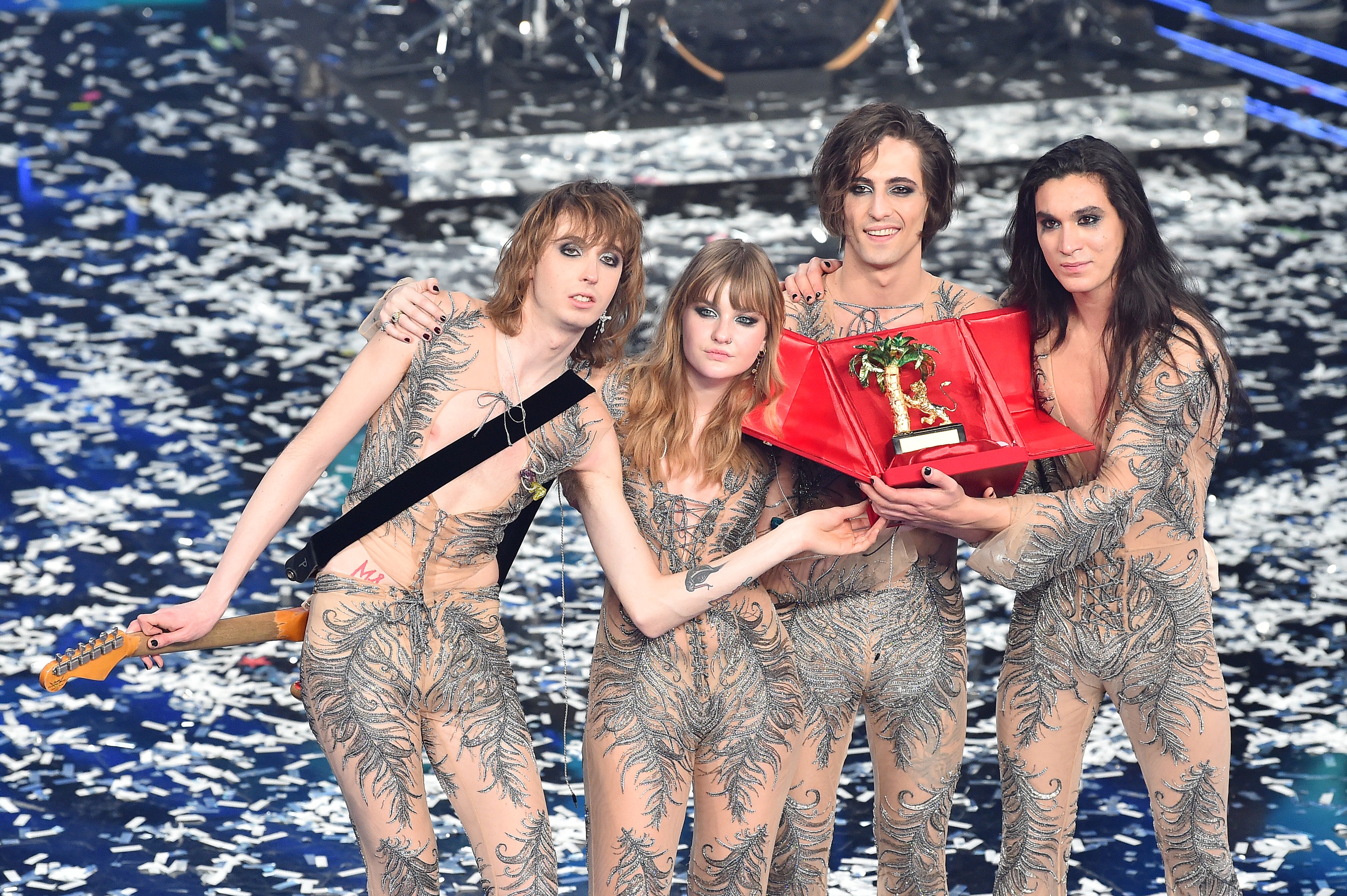The Independent's journalism is supported by our readers. When you purchase through links on our site, we may earn commission.
Maneskin: First Eurovision, next the world
Elisabetta Povoledo explores the past and future of the Eurovision winners and speaks to the people who know them best

When the rock group Maneskin won this year’s Eurovision Song Contest, they were little known outside Italy. Then the competition catapulted the band in front of 180 million viewers, and propelled its winning song, “Zitti e Buoni,” or “Shut Up and Behave,” into Spotify’s global Top 10 – a first for an Italian band.
The song has been streamed on Spotify more than 100 million times. With nearly 18 million listeners in the last month, Maneskin was performing better on the streaming service over that period than Foo Fighters or Kings of Leon.
Eurovision acts typically disappear from the spotlight as soon as the competition wraps, yet Maneskin’s members are hoping to build upon their existing fame here, along with the newly won international interest, to become a rare long-term Eurovision success story.
A post-curtain controversy that dogged the group last month has only increased the band’s notoriety. On the night of the Eurovision victory, rumours spread on social media after a clip from the broadcast went viral, showing the lead singer, Damiano David, hunched over a table backstage. At a news conference later that evening, a Swedish journalist asked if David had been sniffing cocaine on live TV, and the singer denied any wrongdoing.
David took a drug test, which came back negative. The European Broadcasting Union issued a statement saying that “no drug use took place” and that it “considered the matter closed”.
So it has been quite a world-stage debut for a foursome whose combined ages add up to just 83. (David is 22; Victoria De Angelis, the bassist, is 21; and guitarist Thomas Raggi and drummer Ethan Torchio are both 20.)
What I love is the way that they mix clothes for women and men; there is something very revolutionary about them, the way they don’t have any fear
“For us,” De Angelis says in a recent interview, “music is passion, fun, something that lets us blow off steam” – no surprise to anyone who has seen Maneskin perform live. The band is a high-octane powerhouse of onstage charisma and youthful energy.
One Italian music critic compared Maneskin – which means moonlight in Danish, and is pronounced “moan-EH-skin” – to the Energizer Bunny. That may in part explain why “Zitti e Buoni” has transcended what could have been an insurmountable linguistic barrier (although there is already a cover version in Finnish).
The song celebrates individuality and marching to the beat of one’s own drum (or guitar riff). The refrain repeats: “We’re out of our minds, but we’re different from them.”
Enjoy unlimited access to 100 million ad-free songs and podcasts with Amazon Music
Sign up now for a 30-day free trial. Terms apply.
ADVERTISEMENT. If you sign up to this service we will earn commission. This revenue helps to fund journalism across The Independent.
Enjoy unlimited access to 100 million ad-free songs and podcasts with Amazon Music
Sign up now for a 30-day free trial. Terms apply.
ADVERTISEMENT. If you sign up to this service we will earn commission. This revenue helps to fund journalism across The Independent.
With its stylish androgynous nonchalance – accessorised with high heels, black nail-polish and smoky eyes – Maneskin breaks down gender barriers and champions self-expression.
The band was formed in 2015. David, De Angelis and Raggi knew each other from middle school in Rome. Torchio, whose family lives just outside the city, joined the group after responding to an ad in a Facebook group that read: “Musicians Wanted (Rome).”
There weren’t many venues here for fledgling rock bands, so they busked on the street, played in high schools and gigged in restaurants, “where you were expected to bring your own paying public”, David recalls. Small “battle of the bands” competitions “ensured that at least we’d be playing front of an audience”, he adds.
“These are the kind of dynamics that toughen you up,” says Torchio.
After a couple of years of struggling to find gigs, the band went on the 2017 Italian edition of the talent show The X Factor.

Anna Curia, 24, says “it was love at first sight” when she saw the group's audition song on the programme; a few weeks later, she founded the group’s official fan club. “From the first, they had a distinct style and sound,” she says. Other fan clubs soon followed. There’s even one called Mammeskin, for women of a certain age.
The X Factor stint also grabbed the attention of Veronica Etro, of the fashion brand Etro. “They had something,” says Etro, who is the brand’s creative director for its women’s collections. “I was very bewitched.”
The fashion house reached out to the group and began dressing its members for album covers and videos. The collaboration led to Etro providing the outfits for Eurovision, where the group's studded, laminated, red-leather look made you think “Jimi Hendrix meets Velvet Goldmine”, wrote Vanessa Friedman in The New York Times.
“What I love is the way that they mix clothes for women and men,” Etro says in a telephone interview. “There is something very revolutionary about them, the way they don’t have any fear and they have fun with clothes.”
Manuel Agnelli, who was one of the X Factor judges in 2017, took Maneskin under his wing. At first, the band members weren’t musically mature, he says, “but I saw in them characteristics that can’t be taught – it’s something you’re born with; it’s personality”.
The allegations were both infantile and underhand, he said. And they came to nothing, because drug tests came up negative
“Their image is a big part of who they are: their sexuality, their charisma, their bodies. It’s part of rock, it’s part of performance,” says Agnelli.
Maneskin didn’t win The X Factor, coming second to Lorenzo Licitra, a tenor whose style is more in sync with the Italian penchant for big melodic ballads. Yet the program proved to be a springboard.
“They are a television phenomenon,” says Andrea Andrei, a journalist with the Rome daily newspaper Il Messaggero. “Without The X Factor and the machine behind it that churns out products ready for mainstream success, Maneskin would have struggled for a lot longer, like other rock bands have.”
The real surprise, for many Italian commentators, was Maneskin’s win last March at the Sanremo Music Festival, the national event at which Italy’s Eurovision act is chosen. Until a few years ago, Sanremo had mostly attracted Italians whose musical heyday predated Woodstock, but in recent years it has reached out to younger audiences by involving the winners of talent shows like The X-Factor.
“Nothing could be further from rock than Sanremo,” says Massimo Cotto, an Italian music journalist and radio DJ.
So there, too, Maneskin broke ground. “Italy has never had an idyllic relationship with rock music; it never became mainstream,” says Andrei. “Maneskin’s win was unexpected, because they are a real rock band.”

During the interview, David soundly rejects the accusations that he was caught on camera using drugs at Eurovision, complaining that the speculation overshadowed the group’s win.
The allegations were both infantile and underhand, he says. And they came to nothing, because drug tests came up negative. “We know we are clean. We have nothing to hide,” he adds.
Allegations aside, there have been some changes since the Eurovision win.
Merchandise associated with the band’s most recent album sold out. Their music was featured in a Pepsi commercial. And earlier this month, the band parted ways with Marta Dona, their manager since 2017. Some newspapers here wondered whether an Italian management agency had begun to feel too tight for Maneskin’s international aspirations, and the name of Simon Cowell, the mastermind behind The X-Factor, came up as a possible successor. The group has not yet announced who will replace Dona.
Agnelli, the Italian X-Factor judge, offers the quartet some advice for building on its current momentum: to tour as much as possible, to get experience under their belts, and to continue to be themselves.
“It’s their greatest strength,” he says.
This article originally appeared in The New York Times.
Join our commenting forum
Join thought-provoking conversations, follow other Independent readers and see their replies
Comments
Bookmark popover
Removed from bookmarks